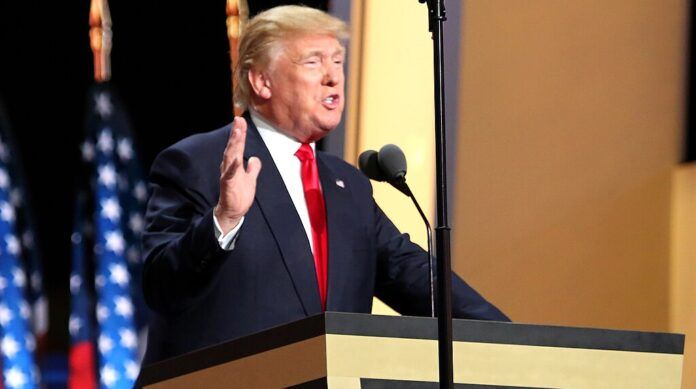Former president Donald Trump announces he will vote against a ballot measure in Florida to protect abortion rights, reversing his earlier supportive stance and facing criticism from conservative leaders
In a dramatic shift, former President Donald Trump has declared he will vote against a Florida ballot measure designed to safeguard abortion rights. His reversal follows significant backlash from conservative supporters after he initially seemed to endorse the measure in a recent NBC News interview.
On August 30, 2024, Trump revealed his decision during a Fox News appearance, stating, “You need more time than six weeks. I’ve disagreed with that right from the early primaries when I heard about it.” His comments refer to Florida’s current law banning most abortions after six weeks of pregnancy, a policy he has criticized in the past.
Embed from Getty ImagesTrump’s announcement comes after he had previously indicated he might support the ballot initiative, which aims to amend the state constitution to protect abortion access up to the point of fetal viability—around 23 to 25 weeks. The former president’s remarks were seen as an endorsement of more lenient abortion policies, sparking criticism from anti-abortion activists who felt betrayed.
In response to Trump’s initial comments, conservative leaders and pro-life advocates expressed strong disapproval. Prominent conservative commentator Erick Erickson criticized Trump’s position, suggesting it could alienate pro-life voters who view the former president’s stance as inconsistent with their values. Albert Mohler Jr., president of the Southern Baptist Theological Seminary, also voiced concerns, accusing Trump of undermining pro-life principles.
The controversy intensified after Trump’s comments were made public. During an NBC News interview, Trump had suggested that a six-week limit was too restrictive and that more time should be allowed. His stance was perceived as a deviation from his previous anti-abortion rhetoric, which had consistently supported restrictive measures.
The Trump campaign attempted to clarify the former president’s position, with running mate JD Vance stating that Trump would make his own decision on the ballot measure based on his judgment. However, Trump’s subsequent decision to vote against the measure has reaffirmed his commitment to a more conservative approach on abortion.
Trump’s position on abortion has long been a contentious issue. During his presidency, he appointed three Supreme Court justices who played a pivotal role in overturning Roe v. Wade, the landmark decision that previously guaranteed abortion rights nationwide. Since then, abortion policy has been left to the states, leading to varied and often restrictive laws.
In Florida, the proposed constitutional amendment seeks to counteract the state’s current near-total ban on abortion. Supporters of the amendment argue that the six-week limit is impractical, as many women may not be aware of their pregnancy within such a short timeframe. Polls indicate significant support for the measure, with a July University of North Florida poll showing that 69% of likely voters back the amendment.
Trump’s reversal on the Florida ballot measure highlights the political challenges he faces as he navigates the complex landscape of abortion politics. His decision reflects a broader struggle within the Republican Party, where there is ongoing tension between conservative activists advocating for strict abortion restrictions and more moderate voices calling for a pragmatic approach.
As Trump campaigns for the 2024 presidential election, his stance on abortion continues to shape his political strategy. While he seeks to appeal to conservative voters with his anti-abortion record, he must also address the concerns of a broader electorate that includes those supporting expanded abortion rights. This balancing act remains a key aspect of his campaign’s approach to contentious social issues.
Analysis
Political: Donald Trump’s reversal on the Florida abortion measure underscores the complex dynamics of abortion politics in the U.S. Trump’s decision to oppose the ballot initiative after initially appearing supportive reflects the pressures from conservative factions within the Republican Party. The backlash from pro-life advocates highlights the challenge Trump faces in maintaining support from his base while addressing the broader political landscape. His stance also reveals the political calculation involved in navigating contentious issues like abortion, which remain central to Republican primary voters.
Social: Trump’s shifting position on abortion illustrates the deep societal divisions over reproductive rights. The debate over Florida’s six-week abortion ban versus broader protections encapsulates the broader national discourse on abortion. Trump’s comments and subsequent reversal demonstrate the influence of public opinion and activist pressure on political figures. Social attitudes toward abortion are increasingly polarized, with significant support for more lenient measures contrasting with strong opposition from conservative groups.
Racial: The racial implications of Trump’s abortion stance are less direct but still relevant in the broader context of reproductive rights. Abortion laws and access can disproportionately affect marginalized communities, including women of color who may face additional barriers to healthcare. Trump’s position on abortion may have varying impacts on these communities, depending on how state policies and national rhetoric influence access to reproductive services and health equity.
Gender: Gender plays a crucial role in the abortion debate, with women being directly affected by reproductive policies. Trump’s stance, which initially seemed supportive but then shifted to a more conservative position, highlights the broader gender implications of abortion laws. Women’s access to reproductive health services and the political discourse surrounding these services are key issues in gender equity. Trump’s comments reflect the ongoing tension between gender-based advocacy for reproductive rights and conservative efforts to restrict access.
Economic: The economic implications of abortion policies are significant, as they affect both healthcare costs and broader economic participation. Restrictive abortion laws can have economic consequences for women, including increased healthcare costs and potential impacts on their ability to participate fully in the workforce. Trump’s position on the Florida measure, coupled with his broader anti-abortion stance, reflects the economic considerations of both the pro-life movement and those advocating for expanded reproductive rights.
